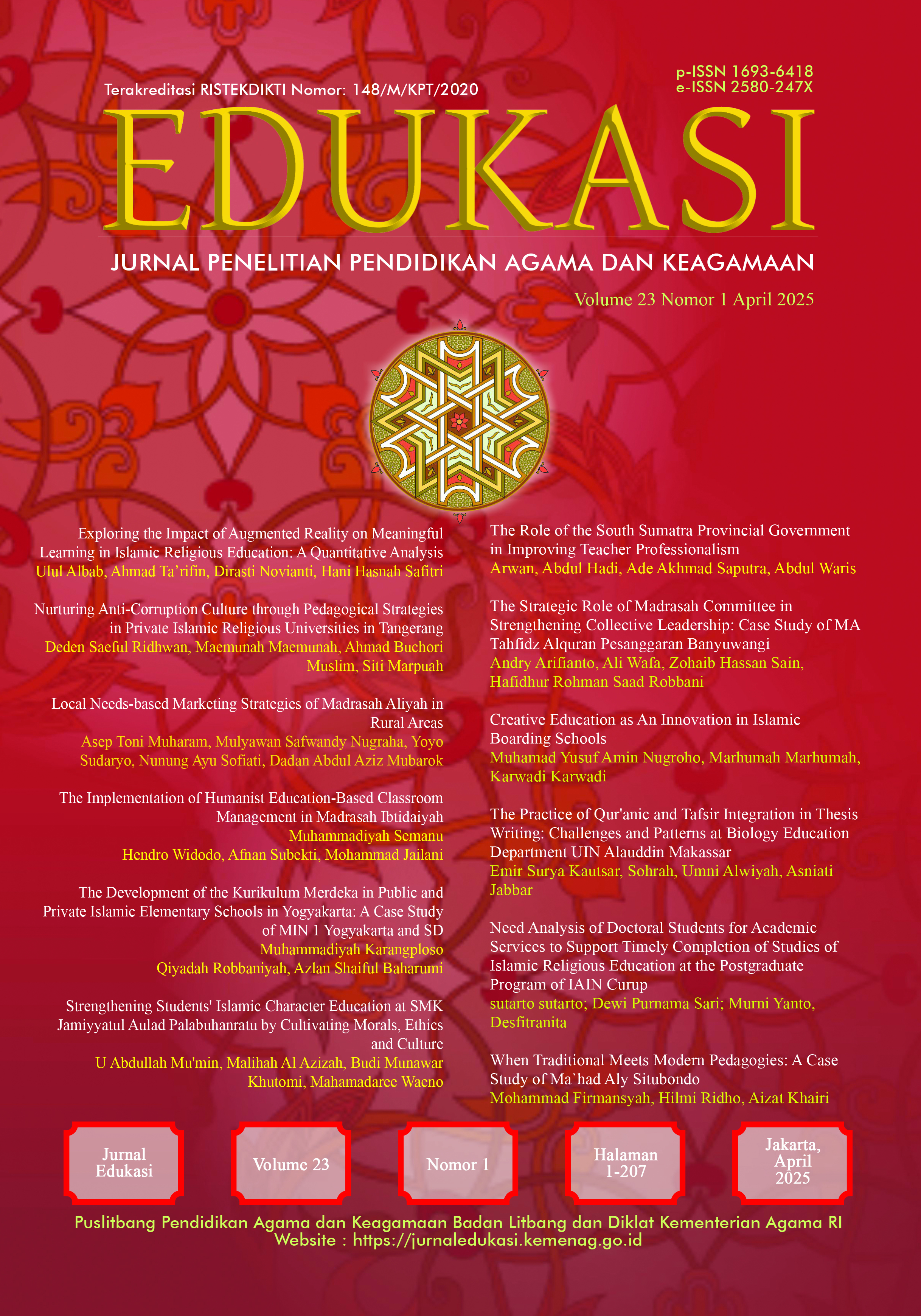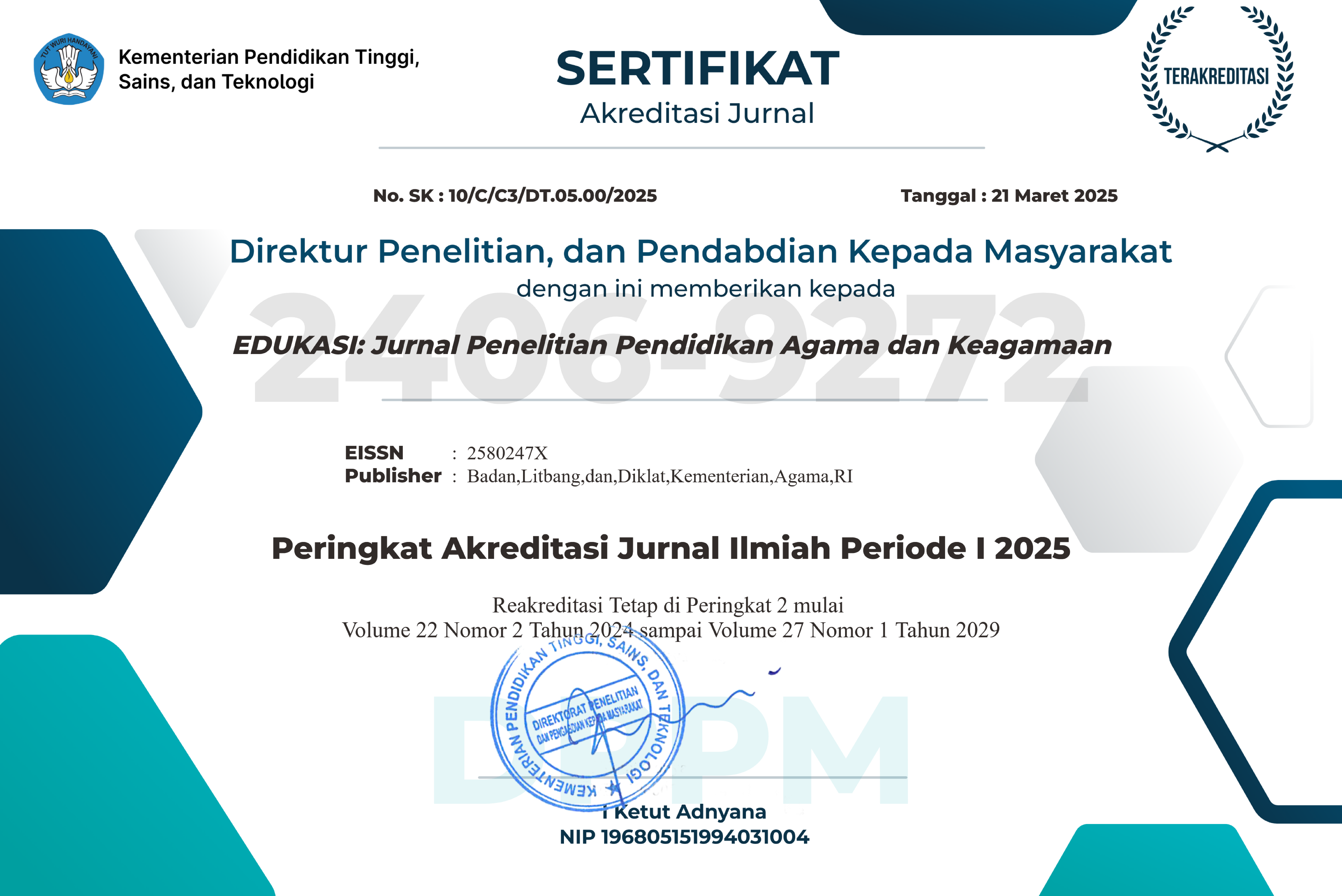The Development of the Kurikulum Merdeka in Public and Private Islamic Elementary Schools in Yogyakarta: A Case Study of MIN 1 Yogyakarta and SD Muhammadiyah Karangploso
DOI:
https://doi.org/10.32729/edukasi.v23i1.2160Keywords:
Kurikulum Merdeka, Islamic Education, Elementary School, Character Development, Learning StrategiesAbstract
This study examines the implementation of the Kurikulum Merdeka in MIN 1 Yogyakarta and SD Muhammadiyah Karangploso, two Islamic elementary schools with distinct approaches. The research analyzes adaptation strategies, challenges, and the effectiveness of maintaining Islamic values while ensuring educational quality. A qualitative case study approach was employed, utilizing interviews, observations, and document analysis techniques.
The findings of this study indicate that MIN 1 Yogyakarta implements student-centered learning and character-building projects through P5RA, whereas SD Muhammadiyah Karangploso emphasizes gamification, environmental exploration and entrepreneurship in P5. Key challenges identified include delays in teaching materials, limited resources, and insufficient teacher training, which are mitigated through self-paced and group training sessions.
The Kurikulum Merdeka promotes flexibility and strengthens Islamic character but necessitates continuous evaluation and improvement of facilities. Unlike previous research that focused on policy readiness, this study highlights local innovations and compares practices between public and private schools. These findings provide strategic recommendations for Islamic schools and policymakers to optimize the Kurikulum Merdeka.
Downloads
References
Ahid, N., & Chamid, N. (2021). Implementation of Indonesian National Qualification Framework Based Curriculum in Higher Islamic Education. Jurnal Pendidikan Islam, 7(1), 109–122. https://doi.org/10.15575/jpi.v7i1.12425
Akhmadi, A. (2023). Implementasi Kurikulum Merdeka di Madrasah Ibtidaiyah. In Andragogi: Jurnal Diklat Teknis Pendidikan dan Keagamaan (Vol. 11, Issue 1, pp. 33–44). https://doi.org/10.36052/andragogi.v11i1.310
Andrianor, A., Sari, R. M., & Adhitya, A. (2024). Institutionalizing Science Integration at UIN Sunan Kalijaga: Insights from Students’ Perspectives. EDUKASI: Jurnal Penelitian Pendidikan Agama Dan Keagamaan, 22(3), 368–386. https://doi.org/https://doi.org/10.32729/edukasi.v22i3.1919
Breidlid, A. (2005). Education in the Sudan: The privileging of an Islamic discourse. Compare, 35(3), 247–263. https://doi.org/10.1080/03057920500212530
Butt, S. (2023). State Islamic universities and legal curriculum reform. In Islam, Education and Radicalism in Indonesia: Instructing Piety (pp. 208–226). https://doi.org/10.4324/9781003269229-13
Darmawan, D. (2018). Pendidikan Karakter Berbasis Budaya Sekolah Di Sekolah. In Jurnal Pendidikan Sekolah Dasar (Vol. 7, Issue 39, pp. 3930–3937). http://journal.student.uny.ac.id/ojs/index.php/pgsd/article/view/14097
Diamond, J. B., & Spillane, J. P. (2016). School leadership and management from a distributed perspective: A 2016 retrospective and prospective. Management in Education, 30(4), 147–154. https://doi.org/10.1177/0892020616665938
Dumeier, H. K., Neininger, M. P., Bernhard, M. K., Syrbe, S., Merkenschlager, A., Zabel, J., Kiess, W., Bertsche, T., & Bertsche, A. (2015). Knowledge and attitudes of school teachers, preschool teachers and students in teacher training about epilepsy and emergency management of seizures. Archives of Disease in Childhood, 100(9), 851–855. https://doi.org/10.1136/archdischild-2015-308306
Efendi, D., Zain, I. M., Elfida, Y., Putra, A. S., & Auliya, S. S. (2024). Enhancing Entrepreneurship Skills in MAN 5 Agam Students through a Studentpreneurship Program. EDUKASI: Jurnal Penelitian Pendidikan Agama Dan Keagamaan, 22(3), 324–338. https://doi.org/https://doi.org/10.32729/edukasi.v22i3.1699
Egeberg, H., McConney, A., & Price, A. (2021). Teachers’ views on effective classroom management: a mixed-methods investigation in Western Australian high schools. Educational Research for Policy and Practice, 20(2), 107–124. https://doi.org/10.1007/s10671-020-09270-w
Fahrudin, A., Nasrulloh, N., Suhadak, F., Haris, A., & Kholqi, A. M. S. (2024). Religious Moderation and Deradicalization in Indonesian Higher Education: A Case Study of ITB and IPB. EDUKASI: Jurnal Penelitian Pendidikan Agama Dan Keagamaan, 22(3), 463–482. https://doi.org/https://doi.org/10.32729/edukasi.v22i3.1974
Fathul Khoeriyah, I., & Nurmandi, A. (2014). Evaluasi Program Wajib Belajar 9 Tahun Pada Sekolah Negeri dan Sekolah Swasta (Studi Kasus di Sekolah Dasar Negeri dan Sekolah Dasar Muhammadiyah di Kota Yogyakarta). In Journal of Governance and Public Policy (Vol. 1, Issue 1). journal.umy.ac.id. https://doi.org/10.18196/jgpp.2014.0008
Fua, J. La, Nurlila, R. U., Gunawan, F., & Wekke, I. S. (2018). Islamic Education on Formation of Environmental Awareness in Pondok Pesantren Indonesia. In IOP Conference Series: Earth and Environmental Science (Vol. 156, Issue 1). https://doi.org/10.1088/1755-1315/156/1/012035
Gallagher, M. (2023). State Islamic universities and education curriculum reform. In Islam, Education and Radicalism in Indonesia: Instructing Piety (pp. 227–252). https://doi.org/10.4324/9781003269229-14
Halstead, J. M. (2004). An Islamic concept of education. Comparative Education, 40(4), 517–529. https://doi.org/10.1080/0305006042000284510
Kurnia, A. M. B., Aliyah, N. D., Azizah, M., Amal, B. K., & Purba, A. S. (2022). Deradicalization Model Through Islamic Education Curriculum in Indonesia, Spain, And Nigeria. Res Militaris, 12(2), 428–439. https://www.scopus.com/inward/record.uri?partnerID=HzOxMe3b&scp=85141156263&origin=inward
Latifah, A. N., Amanda P, F., Cantika K, S., & Wulandari, S. (2023). Implementasi Program Ekstrakurikuler di Sekolah Dasar Negeri dan Sekolah Dasar Swasta. In JLEB: Journal of Law, Education and Business (Vol. 1, Issue 2, pp. 154–159). https://doi.org/10.57235/jleb.v1i2.1089
Lubis, M. A. (2015). Effective implementation of the integrated Islamic education. Global Journal Al-Thaqafah, 5(1), 59–68. https://doi.org/10.7187/gjat792015.05.01
Lukens-Bull, R. A. (2013). Islamic higher education in Indonesia: Continuity and conflict. In Islamic Higher Education in Indonesia: Continuity and Conflict. https://doi.org/10.1057/9781137313416
Maloni, M. J., Palmer, T. B., Cohen, M., Gligor, D. M., Grout, J. R., & Myers, R. (2021). Decoupling responsible management education: Do business schools walk their talk? International Journal of Management Education, 19(1). https://doi.org/10.1016/j.ijme.2021.100456
Marisa, M. (2021). Inovasi Kurikulum mbkm di era society 5.0. Santhet: Jurnal Sejarah, Pendidikan Dan Humaniora, 5(1), 72. https://ejournal.unibabwi.ac.id/index.php/santhet/article/view/1317%0Ahttps://ejournal.unibabwi.ac.id/index.php/santhet/article/download/1317/903
Memon, N. A., Abdalla, M., & Alhashmi, M. (2021). Curriculum Renewal for Islamic Education: Critical Perspectives on Teaching Islam in Primary and Secondary Schools. In Curriculum Renewal for Islamic Education: Critical Perspectives on Teaching Islam in Primary and Secondary Schools. https://doi.org/10.4324/9780429276811
Muhammad, R., & Mualimin, M. (2024). Students’ Perception and Social Acceptance towards Lecturers with Diffability (Different Ability). EDUKASI: Jurnal Penelitian Pendidikan Agama Dan Keagamaan, 22(3), 356–386. https://doi.org/https://doi.org/10.32729/edukasi.v22i3.1872
Nasir, M., Rijal, M. K., Kahar, S. K., Rahman, F., & Komariah, A. (2024). University Leaders’ Views on Independent Campus Curriculum as Educational Reforms in Indonesian Islamic Universities. IAFOR Journal of Education, 12(3), 147–172. https://doi.org/10.22492/IJE.12.3.07
Nawi, M. A. M., Jamsari, E. A., Hamzah, M. I., Sulaiman, A., & Umar, A. (2012). The impact of globalization on current islamic education. Australian Journal of Basic and Applied Sciences, 6(8), 74–78. https://api.elsevier.com/content/abstract/scopus_id/84870466145
Nonet, G., Kassel, K., & Meijs, L. (2016). Understanding Responsible Management: Emerging Themes and Variations from European Business School Programs. Journal of Business Ethics, 139(4), 717–736. https://doi.org/10.1007/s10551-016-3149-z
Nor, M. R. M., & Malim, M. (2014). Revisiting islamic education: The case of Indonesia. Journal for Multicultural Education, 8(4), 261–276. https://doi.org/10.1108/JME-05-2014-0019
Nugraha, T. S. (2022). Kurikulum Merdeka untuk pemulihan krisis pembelajaran. Inovasi Kurikulum, 19(2), 251–262. https://doi.org/10.17509/jik.v19i2.45301
Perry, T. T., & Turner, J. H. (2019). School-Based Telemedicine for Asthma Management. Journal of Allergy and Clinical Immunology: In Practice, 7(8), 2524–2532. https://doi.org/10.1016/j.jaip.2019.08.009
Purnawanto Ahmad. (2022). Implementasi Profil Pelajar Pancasila dalam Pembelajaran Kurikulum Merdeka. Jurnal Ilmiah Pedagogy, 21. https://jurnal.staimuhblora.ac.id/index.php/pedagogy/article/view/139
Rahmat, U. (2019). Analisis Keunggulan Sekolah Dasar Swasta Berdasarkan Standar Nasional Pendidikan Dengan Menggunakan Metode Biplot. In Jurnal Saintika Unpam : Jurnal Sains dan Matematika Unpam (Vol. 1, Issue 2, p. 212). core.ac.uk. https://doi.org/10.32493/jsmu.v1i2.2385
Ramadan, F., & Imam Tabroni. (2020). Implementasi kurikulum merdeka belajar. Lebah, 13(2), 66–69. https://doi.org/10.35335/lebah.v13i2.63
Ripandi, A. J. (2023). Hakikat Kurikulum Dalam Pendidikan. In Jurnal Al Wahyu (Vol. 1, Issue 2, pp. 123–133). jisma.org. https://doi.org/10.62214/jayu.v1i2.129
Rofiaty, R. (2019). The relational model of entrepreneurship and knowledge management toward innovation, strategy implementation and improving Islamic boarding school performance. Journal of Modelling in Management, 14(3), 662–685. https://doi.org/10.1108/JM2-05-2018-0068
Samier, E. A., & Hammad, W. (2021). Humanistic Knowledge Traditions That Can Inform Educational Administration and Leadership Curricula: Ancient, Islamic, Confucian, Buddhist and European Approaches. In Internationalisation of Educational Administration and Leadership Curriculum: Voices and Experiences from the ‘Peripheries’ (pp. 27–46). https://doi.org/10.1108/978-1-83909-864-220211003
Saridudin, S., Rahim, H., Rosyada, D., Zuhdi, M., & Dahri, H. (2024). Strategies to Strengthen Vocational Education in Islamic Contexts: Preparing Madrasah Aliyah to Face the Challenges of Industry 4.0. EDUKASI: Jurnal Penelitian Pendidikan Agama Dan Keagamaan, 22(3), 483–499. https://doi.org/https://doi.org/10.32729/edukasi.v22i3.1997
Sebastian, J., Allensworth, E., Wiedermann, W., Hochbein, C., & Cunningham, M. (2019). Principal Leadership and School Performance: An Examination of Instructional Leadership and Organizational Management. Leadership and Policy in Schools, 18(4), 591–613. https://doi.org/10.1080/15700763.2018.1513151
Setyawan, H., Alim, A. M., Listyarini, A. E., Suri, P. T., Mahsusi, J., Rahmatullah, M. I., Sugiarto, T., Shidiq, A. A. P., Kozina, Z., Eken, Ö., Latino, F., Tafuri, F., & Pranoto, N. W. (2024). Implementation of Archery Class Management at the Pre-Extracurricular Program Stage To Improve Archery Skills of Elementary School Students. Retos, 55, 867–873. https://doi.org/10.47197/retos.v55.105275
Shaleh, M., Tobroni, Mundir, & Umiarso. (2024). Development of a Holistic-integrative Islamic Religious Education Curriculum in an Integrated Islamic School. Eurasian Journal of Educational Research, 2024(113), 227–241. https://doi.org/10.14689/ejer.2024.113.13
Simon Paulus Olak Wuwur, E. (2023). Problematika Implementasi Kurikulum Merdeka Di Sekolah Dasar. SOKO GURU: Jurnal Ilmu Pendidikan, 3(1), 1–9. https://doi.org/10.55606/sokoguru.v3i1.1417
Situmorang, T. E. S., Selly nainggolan, Inriyanti simamora, & Dodi irwanto siburian. (2024). Tantangan Tenaga Pendidik Dalam Proses Pembelajaran di Sekolah Dasar Swasta Santa Maria Tarutung. Jurnal Ilmu Pendidikan Dan Sosial, 3(1), 62–68. https://doi.org/10.58540/jipsi.v3i1.540
Suhayib, & Ansyari, M. F. (2023). Design of Islamic Religious Education: Purposes, alignment of curriculum components and contexts. British Journal of Religious Education, 45(4), 382–393. https://doi.org/10.1080/01416200.2023.2220940
Suryaman, M. (2020). Orientasi Pengembangan Kurikulum Merdeka Belajar. Seminar Nasional Pendidikan Bahasa Dan Sastra, 1(1). https://ejournal.unib.ac.id/semiba/article/view/13357
Syaripudin, S., Witarsa, R., & Masrul, M. (2023). Analisis Implementasi Kurikulum Merdeka pada Guru-guru Sekolah Dasar Negeri 6 Selatpanjang Selatan. Journal of Education Research, 4(1), 178–184. https://jer.or.id/index.php/jer/article/view/142%0Ahttps://jer.or.id/index.php/jer/article/download/142/115
Tan, C. (2012). Islamic education and indoctrination: The case in Indonesia. In Islamic Education and Indoctrination: The Case in Indonesia. https://doi.org/10.4324/9780203817766
Taufik, M. (2020). Strategic Role of Islamic Religious Education in Strengthening Character Education in the Era of Industrial Revolution 4.0. Jurnal Ilmiah Islam Futura, 20(1), 86–104. https://doi.org/10.22373/jiif.v20i1.5797
Trinies, V., Caruso, B. A., Sogoré, A., Toubkiss, J., & Freeman, M. C. (2015). Uncovering the challenges to menstrual hygiene management in schools in Mali. Waterlines, 34(1), 31–40. https://doi.org/10.3362/1756-3488.2015.004
Vhalery, R., Setyastanto, A. M., & Leksono, A. W. (2022). Kurikulum Merdeka Belajar Kampus Merdeka: Sebuah Kajian Literatur. In Research and Development Journal of Education (Vol. 8, Issue 1, p. 185). scholar.archive.org. https://doi.org/10.30998/rdje.v8i1.11718
Yugo, T., Yunani, A., & Salsabila, N. (2024). The Effect of Madrasah Diniyah Takmiliyah Awaliyah Learning on the Understanding of Islamic Education Subject in Elementary School. EDUKASI: Jurnal Penelitian Pendidikan Agama Dan Keagamaan, 22(3), 339–355. https://doi.org/https://doi.org/10.32729/edukasi.v22i3.1829
Zighan, S., & EL-Qasem, A. (2021). Lean thinking and higher education management: revaluing the business school programme management. International Journal of Productivity and Performance Management, 70(3), 675–703. https://doi.org/10.1108/IJPPM-05-2019-0215
Downloads
Published
Issue
Section
License
Copyright (c) 2025 Qiyadah Robbaniyah, Azlan Shaiful Baharumi

This work is licensed under a Creative Commons Attribution-ShareAlike 4.0 International License.








